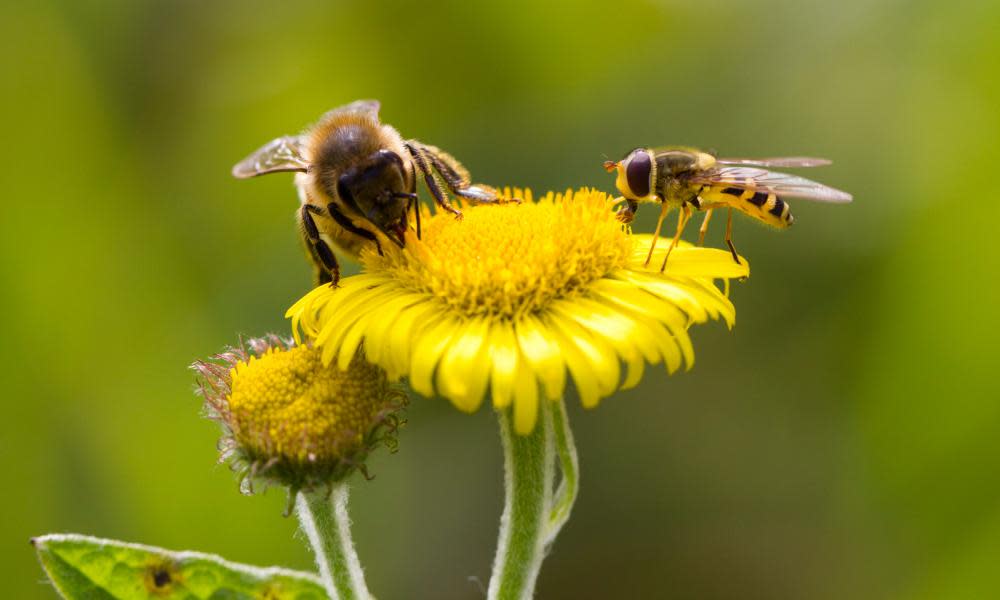Halve UK pesticide use to save insects, say conservationists

The use of pesticides in the UK must be at least halved to reverse steep losses in insect abundance and boost the natural world that depends on them, according to a report.
It warns that insects are the “canaries in the coal mine” of the natural world and that everyone, including the government, local authorities, community groups and individuals, needs to become insect champions.
The report from the Wildlife Trusts presents examples of action already under way, from flower-rich insect superhighways along road verges to pesticide bans in city parks and the reintroduction of long-lost butterflies.
The group is calling on ministers to slash pesticide use by at least 50% by 2030, matching a target recently set by the European Union. The trusts also want the UK’s post-Brexit farming regime to support insect conservation and to ensure trade deals do not weaken protections. A network of nature-rich areas covering 30% of the UK – double today’s level – is also needed, the report said.
“If we get it right for insects we get it right for everything else,” said Prof Dave Goulson, at the University of Sussex and lead author of the report. “Insects are the canaries in the coal mine: their collapse is an alarm bell that we must not ignore. Action is needed from every section of society.”
Craig Bennett, the chief executive of the Wildlife Trusts, said: “The vital role that insects perform has been undermined and everything that depends on them suffers, from hedgehogs to nightingales, wildflowers to wetlands. The agriculture bill [currently going through parliament] is a golden opportunity to set high standards in law.”
The UK produced a National Action Plan on the Sustainable Use of Pesticides in 2013 which is now overdue for review. It was described as “woefully weak” by the Pesticides Action Network, as it set no target for reductions.
The biggest assessment of global insect abundances to date was published in April and shows a drop of 25% in the last 30 years, with accelerating declines in Europe that shocked scientists.
The previous largest assessment led scientists to warn of “catastrophic consequences for the survival of mankind” if insect losses were not halted. Recent analyses from some locations have found collapses in insect abundance, such as 75% in German nature reserves.
Groups around the UK have been boosting local insect populations, including the On the Verge project in Stirling, which has now worked with more than 100 schools, local councils, churches and care homes to plant new native wildflower areas. Research shows the verge sites have 25 times more flowers and 50 times more bumblebees than adjacent grass areas that were mown.
In the London borough of Lambeth the Incredible Edible food project successfully campaigned to end pesticide use. “Our passion is local food, so insects are really important to us,” said Janie Bickersteth, chair of the Lambeth group. “Lambeth has now agreed to go pesticide free by 2021 and has already stopped spraying in all its parks.”
The Kent Wildlife Trust and partners have created 146 roadside nature reserves and 13 “bee roads”, which they call insect superhighways and provide forage and refuge for insects. “The landscape in Kent, like much of the UK, has become increasingly fragmented. But our road networks provide a huge opportunity to help address this issue,” said Rosie Bleet, the trust’s bee roads officer.
In May, the Manchester argus butterfly was returned to Astley Moss in Greater Manchester for the first time in over 100 years. It was once common across the region, but due to the destruction of its peatland homes, it had become locally extinct.
Insect-friendly farming is also highlighted in the report. Jack Kelly, who has 90 acres of mixed farmland in County Down, has used government-funded agri-environment schemes and voluntary work to create a network of flower and seed-rich habitats, with large hedgerows and wetlands. “I’ve always believed that if you look after nature, it will look after you,” he said. “With insect populations plummeting, we must do everything we can to reverse this trend.”

 Yahoo News
Yahoo News 
